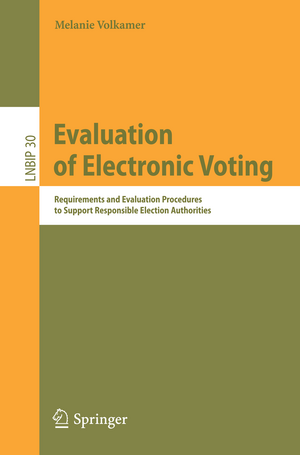Evaluation of Electronic Voting: Requirements and Evaluation Procedures to Support Responsible Election Authorities: Lecture Notes in Business Information Processing, cartea 30
Autor Melanie Volkameren Limba Engleză Paperback – 2 iun 2009
To address this problem, Volkamer structured her work into four parts: "Fundamentals" provides an introduction to the relevant issues of electronic voting. "Requirements" contributes a standardized, consistent, and exhaustive list of requirements for e-voting systems. "Evaluation" presents the proposal and discussion of a standardized evaluation methodology and certification procedure called a core Protection Profile. Finally, "Application" describes the evaluation of two available remote electronic voting systems according to the core Protection Profile.
The results presented are based on theoretical considerations as well as on practical experience. In accordance with the German Society of Computer Scientists, Volkamer succeeded in specifying a "Protection Profile for a Basic Set of Security Requirements for Online Voting Products," which has been certified by the German Federal Office for Security in Information Technology. Her book is of interest not only to developers of security-critical systems, but also to lawyers, security officers, and politicians involved in the introduction or certification of electronic voting systems.
Din seria Lecture Notes in Business Information Processing
- 20%
 Preț: 327.95 lei
Preț: 327.95 lei - 20%
 Preț: 328.79 lei
Preț: 328.79 lei -
 Preț: 285.94 lei
Preț: 285.94 lei - 20%
 Preț: 415.80 lei
Preț: 415.80 lei -
 Preț: 378.12 lei
Preț: 378.12 lei - 20%
 Preț: 701.97 lei
Preț: 701.97 lei - 20%
 Preț: 580.63 lei
Preț: 580.63 lei -
 Preț: 391.61 lei
Preț: 391.61 lei - 20%
 Preț: 695.32 lei
Preț: 695.32 lei - 20%
 Preț: 323.80 lei
Preț: 323.80 lei - 20%
 Preț: 332.89 lei
Preț: 332.89 lei - 20%
 Preț: 341.15 lei
Preț: 341.15 lei -
 Preț: 392.60 lei
Preț: 392.60 lei -
 Preț: 383.93 lei
Preț: 383.93 lei - 20%
 Preț: 332.89 lei
Preț: 332.89 lei -
 Preț: 381.98 lei
Preț: 381.98 lei -
 Preț: 383.93 lei
Preț: 383.93 lei -
 Preț: 385.62 lei
Preț: 385.62 lei - 20%
 Preț: 328.09 lei
Preț: 328.09 lei -
 Preț: 387.38 lei
Preț: 387.38 lei -
 Preț: 384.86 lei
Preț: 384.86 lei -
 Preț: 377.95 lei
Preț: 377.95 lei -
 Preț: 384.86 lei
Preț: 384.86 lei -
 Preț: 387.75 lei
Preț: 387.75 lei -
 Preț: 379.09 lei
Preț: 379.09 lei -
 Preț: 384.86 lei
Preț: 384.86 lei -
 Preț: 486.42 lei
Preț: 486.42 lei - 20%
 Preț: 411.66 lei
Preț: 411.66 lei -
 Preț: 391.61 lei
Preț: 391.61 lei -
 Preț: 392.37 lei
Preț: 392.37 lei -
 Preț: 483.55 lei
Preț: 483.55 lei - 20%
 Preț: 340.64 lei
Preț: 340.64 lei -
 Preț: 383.93 lei
Preț: 383.93 lei - 20%
 Preț: 346.24 lei
Preț: 346.24 lei -
 Preț: 398.35 lei
Preț: 398.35 lei -
 Preț: 394.51 lei
Preț: 394.51 lei - 20%
 Preț: 330.90 lei
Preț: 330.90 lei -
 Preț: 384.48 lei
Preț: 384.48 lei - 20%
 Preț: 418.27 lei
Preț: 418.27 lei -
 Preț: 486.42 lei
Preț: 486.42 lei -
 Preț: 399.29 lei
Preț: 399.29 lei -
 Preț: 481.58 lei
Preț: 481.58 lei - 20%
 Preț: 338.68 lei
Preț: 338.68 lei -
 Preț: 479.67 lei
Preț: 479.67 lei - 20%
 Preț: 328.79 lei
Preț: 328.79 lei - 20%
 Preț: 352.67 lei
Preț: 352.67 lei -
 Preț: 399.29 lei
Preț: 399.29 lei -
 Preț: 391.61 lei
Preț: 391.61 lei - 20%
 Preț: 419.10 lei
Preț: 419.10 lei
Preț: 387.75 lei
Nou
Puncte Express: 582
Preț estimativ în valută:
74.20€ • 80.85$ • 62.52£
74.20€ • 80.85$ • 62.52£
Carte tipărită la comandă
Livrare economică 23 aprilie-07 mai
Preluare comenzi: 021 569.72.76
Specificații
ISBN-13: 9783642016615
ISBN-10: 3642016618
Pagini: 264
Ilustrații: XIV, 248 p.
Dimensiuni: 155 x 235 x 18 mm
Greutate: 0.41 kg
Ediția:2009
Editura: Springer Berlin, Heidelberg
Colecția Springer
Seria Lecture Notes in Business Information Processing
Locul publicării:Berlin, Heidelberg, Germany
ISBN-10: 3642016618
Pagini: 264
Ilustrații: XIV, 248 p.
Dimensiuni: 155 x 235 x 18 mm
Greutate: 0.41 kg
Ediția:2009
Editura: Springer Berlin, Heidelberg
Colecția Springer
Seria Lecture Notes in Business Information Processing
Locul publicării:Berlin, Heidelberg, Germany
Public țintă
ResearchCuprins
I: Fundamentals.- Implementations of Electronic Voting.- Related Work – A Landscape of Requirement Catalogues.- II: Requirements.- Process and Framework Description.- Requirements for Electronic Voting Machines.- Requirements for Remote Electronic Voting.- III: Evaluation.- Evaluation Methodology.- Core Protection Profile.- IV: Application.- Proof of Concept.- Separation of Duty Principle.- Future Work – Open Issues.- V: Conclusion.- Summary and Concluding Words.
Recenzii
From the reviews:
"Electronic voting (e-voting) is an instrument of democracy in an information society … . There aren’t many titles on e-voting available, especially on the evaluation of working systems; this book is a valuable contribution to the literature. I recommend it to readers who are interested in an electoral process based on information and communication technology, and students in the fields of sociology and policy. Information systems professionals may also find it to be a helpful resource on the electoral process and e-voting systems." (F. J. Ruzic, ACM Computing Reviews, October, 2009)
"Electronic voting (e-voting) is an instrument of democracy in an information society … . There aren’t many titles on e-voting available, especially on the evaluation of working systems; this book is a valuable contribution to the literature. I recommend it to readers who are interested in an electoral process based on information and communication technology, and students in the fields of sociology and policy. Information systems professionals may also find it to be a helpful resource on the electoral process and e-voting systems." (F. J. Ruzic, ACM Computing Reviews, October, 2009)
Textul de pe ultima copertă
Electronic voting has a young and attractive history, both in the design of basic cryptographic methods and protocols and in the application by communities who are in the vanguard of technologies. The crucial aspect of security for electronic voting systems is subject to research by computer scientists as well as by legal, social and political scientists. The essential question is how to provide a trustworthy base for secure electronic voting, and hence how to prevent accidental or malicious abuse of electronic voting in elections.
To address this problem, Volkamer structured her work into four parts: "Fundamentals" provides an introduction to the relevant issues of electronic voting. "Requirements" contributes a standardized, consistent, and exhaustive list of requirements for e-voting systems. "Evaluation" presents the proposal and discussion of a standardized evaluation methodology and certification procedure called a core Protection Profile. Finally, "Application" describes the evaluation of two available remote electronic voting systems according to the core Protection Profile.
The results presented are based on theoretical considerations as well as on practical experience. In accordance with the German Society of Computer Scientists, Volkamer succeeded in specifying a "Protection Profile for a Basic Set of Security Requirements for Online Voting Products," which has been certified by the German Federal Office for Security in Information Technology. Her book is of interest not only to developers of security-critical systems, but also to lawyers, security officers, and politicians involved in the introduction or certification of electronic voting systems.
To address this problem, Volkamer structured her work into four parts: "Fundamentals" provides an introduction to the relevant issues of electronic voting. "Requirements" contributes a standardized, consistent, and exhaustive list of requirements for e-voting systems. "Evaluation" presents the proposal and discussion of a standardized evaluation methodology and certification procedure called a core Protection Profile. Finally, "Application" describes the evaluation of two available remote electronic voting systems according to the core Protection Profile.
The results presented are based on theoretical considerations as well as on practical experience. In accordance with the German Society of Computer Scientists, Volkamer succeeded in specifying a "Protection Profile for a Basic Set of Security Requirements for Online Voting Products," which has been certified by the German Federal Office for Security in Information Technology. Her book is of interest not only to developers of security-critical systems, but also to lawyers, security officers, and politicians involved in the introduction or certification of electronic voting systems.
Caracteristici
Includes supplementary material: sn.pub/extras









